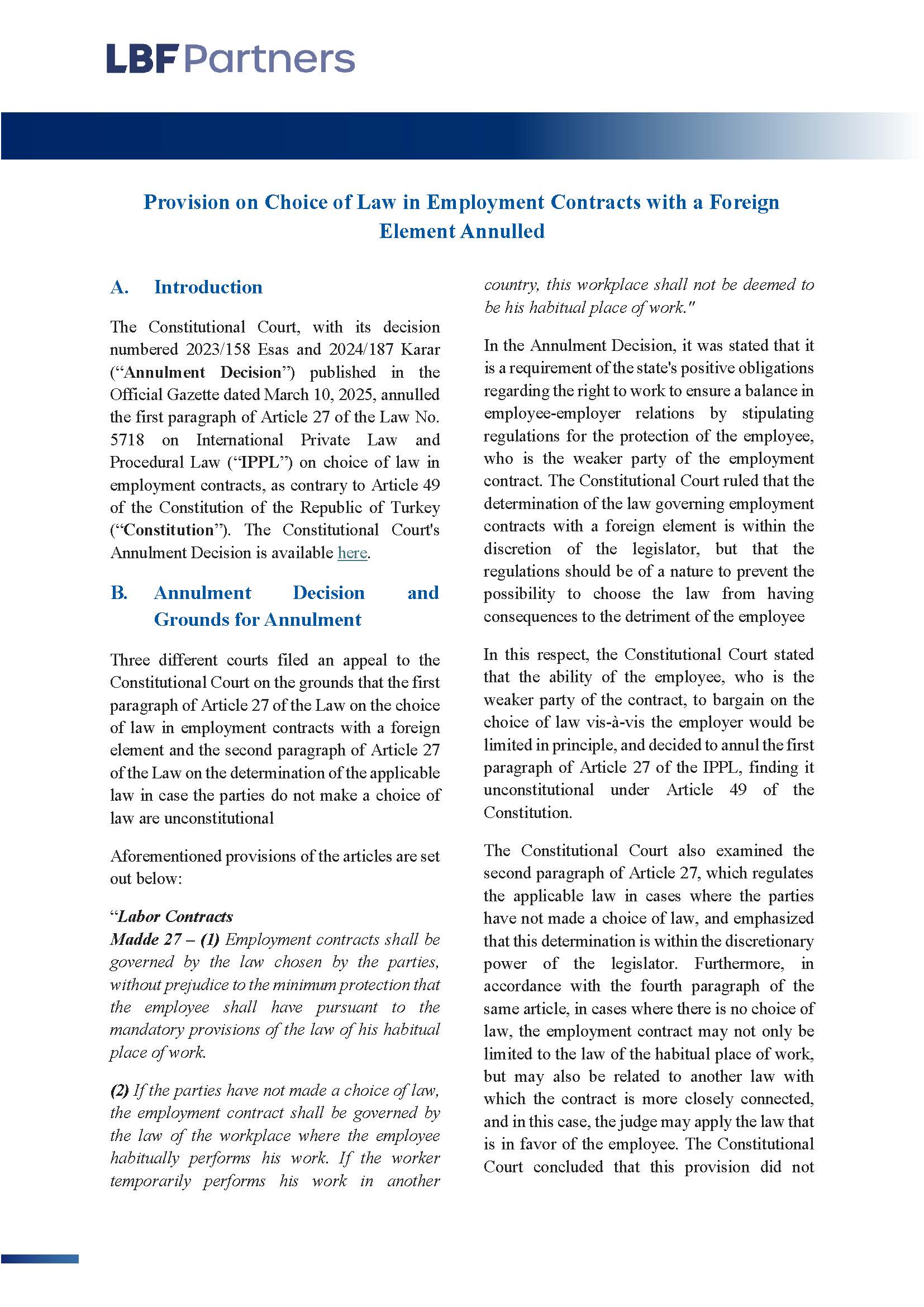Provision on Choice of Law in Employment Contracts with a Foreign Element Annulled
A. Introduction
The Constitutional Court, with its decision numbered 2023/158 Esas and 2024/187 Karar (“Annulment Decision”) published in the Official Gazette dated March 10, 2025, annulled the first paragraph of Article 27 of the Law No. 5718 on International Private Law and Procedural Law (“IPPL”) on choice of law in employment contracts, as contrary to Article 49 of the Constitution of the Republic of Turkey (“Constitution”). The Constitutional Court's Annulment Decision is available here.
B. Annulment Decision and Grounds for Annulment
Three different courts filed an appeal to the Constitutional Court on the grounds that the first paragraph of Article 27 of the Law on the choice of law in employment contracts with a foreign element and the second paragraph of Article 27 of the Law on the determination of the applicable law in case the parties do not make a choice of law are unconstitutional
Aforementioned provisions of the articles are set out below:
“Labor Contracts Madde 27 – (1) Employment contracts shall be governed by the law chosen by the parties, without prejudice to the minimum protection that the employee shall have pursuant to the mandatory provisions of the law of his habitual place of work.
(2) If the parties have not made a choice of law, the employment contract shall be governed by the law of the workplace where the employee habitually performs his work. If the worker temporarily performs his work in another country, this workplace shall not be deemed to be his habitual place of work."
In the Annulment Decision, it was stated that it is a requirement of the state's positive obligations regarding the right to work to ensure a balance in employee-employer relations by stipulating regulations for the protection of the employee, who is the weaker party of the employment contract. The Constitutional Court ruled that the determination of the law governing employment contracts with a foreign element is within the discretion of the legislator, but that the regulations should be of a nature to prevent the possibility to choose the law from having consequences to the detriment of the employee.
In this respect, the Constitutional Court stated that the ability of the employee, who is the weaker party of the contract, to bargain on the choice of law vis-à-vis the employer would be limited in principle, and decided to annul the first paragraph of Article 27 of the IPPL, finding it unconstitutional under Article 49 of the Constitution.
The Constitutional Court also examined the second paragraph of Article 27, which regulates the applicable law in cases where the parties have not made a choice of law, and emphasized that this determination is within the discretionary power of the legislator. Furthermore, in accordance with the fourth paragraph of the same article, in cases where there is no choice of law, the employment contract may not only be limited to the law of the habitual place of work, but may also be related to another law with which the contract is more closely connected, and in this case, the judge may apply the law that is in favor of the employee. The Constitutional Court concluded that this provision did not contradict the positive obligations of the state to protect employees, and held that the second paragraph of Article 27 of the IPPL was not contrary to Article 49 of the Constitution.
C. Grounds for Dissenting Opinion
In the dissenting opinion written by two members who disagreed with the majority opinion for annulment, it was stated that the annulment decision was based on the idea that Turkish workers go to work in foreign countries where the legal protection is weak and in the event of a choice of law, they would be deprived of the protection of Turkish law, that the Law on Civil Procedure allows the choice of law in other types of contracts such as consumer contracts, that the law contains integrity and consistency in this sense and that the minimum protection of the law of the habitual place of business is reserved in the first paragraph..
Furthermore, in the reasoning of the dissenting opinion, even if it is accepted for a moment that the Annulment Decision is appropriate, it is stated that the provision that should be annulled should not be the first paragraph, but the fourth paragraph, which excludes the provision by not referring to the first paragraph in order to apply the more closely related law, and for this reason, it is argued that the unconstitutionality is essentially in the fourth paragraph.
D. Conclusion
As a result, the Constitutional Court decided to annul the first paragraph of Article 27 of the IPPL on the grounds that it is contrary to Article 49 of the Constitution and that the annulment provision shall enter into force six months after the date of publication of the Annulment Decision in the Official Gazette.
On the other hand, the second paragraph on the applicable law in the absence of a choice of law by the parties was found to be in conformity with the Constitution and decided to remain in force.
For more information and support, please contact us at info@lbfpartners.com .
LBF Partners Law Firm
The Constitutional Court, with its decision numbered 2023/158 Esas and 2024/187 Karar (“Annulment Decision”) published in the Official Gazette dated March 10, 2025, annulled the first paragraph of Article 27 of the Law No. 5718 on International Private Law and Procedural Law (“IPPL”) on choice of law in employment contracts, as contrary to Article 49 of the Constitution of the Republic of Turkey (“Constitution”). The Constitutional Court's Annulment Decision is available here.
B. Annulment Decision and Grounds for Annulment
Three different courts filed an appeal to the Constitutional Court on the grounds that the first paragraph of Article 27 of the Law on the choice of law in employment contracts with a foreign element and the second paragraph of Article 27 of the Law on the determination of the applicable law in case the parties do not make a choice of law are unconstitutional
Aforementioned provisions of the articles are set out below:
“Labor Contracts Madde 27 – (1) Employment contracts shall be governed by the law chosen by the parties, without prejudice to the minimum protection that the employee shall have pursuant to the mandatory provisions of the law of his habitual place of work.
(2) If the parties have not made a choice of law, the employment contract shall be governed by the law of the workplace where the employee habitually performs his work. If the worker temporarily performs his work in another country, this workplace shall not be deemed to be his habitual place of work."
In the Annulment Decision, it was stated that it is a requirement of the state's positive obligations regarding the right to work to ensure a balance in employee-employer relations by stipulating regulations for the protection of the employee, who is the weaker party of the employment contract. The Constitutional Court ruled that the determination of the law governing employment contracts with a foreign element is within the discretion of the legislator, but that the regulations should be of a nature to prevent the possibility to choose the law from having consequences to the detriment of the employee.
In this respect, the Constitutional Court stated that the ability of the employee, who is the weaker party of the contract, to bargain on the choice of law vis-à-vis the employer would be limited in principle, and decided to annul the first paragraph of Article 27 of the IPPL, finding it unconstitutional under Article 49 of the Constitution.
The Constitutional Court also examined the second paragraph of Article 27, which regulates the applicable law in cases where the parties have not made a choice of law, and emphasized that this determination is within the discretionary power of the legislator. Furthermore, in accordance with the fourth paragraph of the same article, in cases where there is no choice of law, the employment contract may not only be limited to the law of the habitual place of work, but may also be related to another law with which the contract is more closely connected, and in this case, the judge may apply the law that is in favor of the employee. The Constitutional Court concluded that this provision did not contradict the positive obligations of the state to protect employees, and held that the second paragraph of Article 27 of the IPPL was not contrary to Article 49 of the Constitution.
C. Grounds for Dissenting Opinion
In the dissenting opinion written by two members who disagreed with the majority opinion for annulment, it was stated that the annulment decision was based on the idea that Turkish workers go to work in foreign countries where the legal protection is weak and in the event of a choice of law, they would be deprived of the protection of Turkish law, that the Law on Civil Procedure allows the choice of law in other types of contracts such as consumer contracts, that the law contains integrity and consistency in this sense and that the minimum protection of the law of the habitual place of business is reserved in the first paragraph..
Furthermore, in the reasoning of the dissenting opinion, even if it is accepted for a moment that the Annulment Decision is appropriate, it is stated that the provision that should be annulled should not be the first paragraph, but the fourth paragraph, which excludes the provision by not referring to the first paragraph in order to apply the more closely related law, and for this reason, it is argued that the unconstitutionality is essentially in the fourth paragraph.
D. Conclusion
As a result, the Constitutional Court decided to annul the first paragraph of Article 27 of the IPPL on the grounds that it is contrary to Article 49 of the Constitution and that the annulment provision shall enter into force six months after the date of publication of the Annulment Decision in the Official Gazette.
On the other hand, the second paragraph on the applicable law in the absence of a choice of law by the parties was found to be in conformity with the Constitution and decided to remain in force.
For more information and support, please contact us at info@lbfpartners.com .
LBF Partners Law Firm








 Download PDF
Download PDF

 e.ozcelik@lbfpartners.com
e.ozcelik@lbfpartners.com